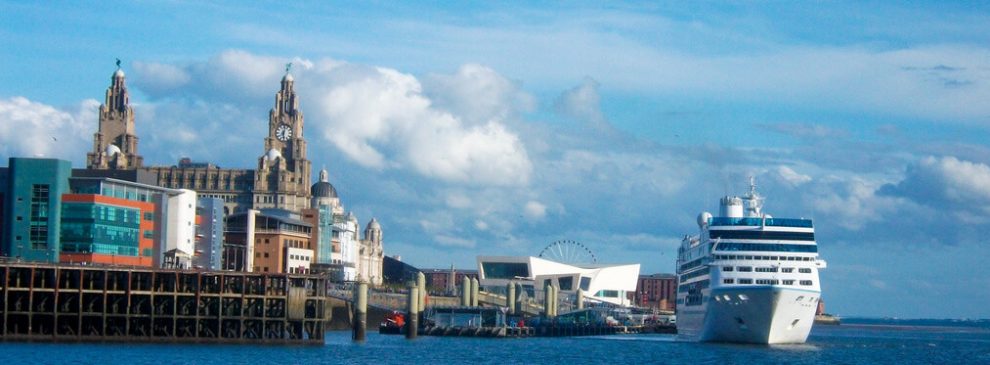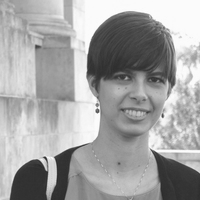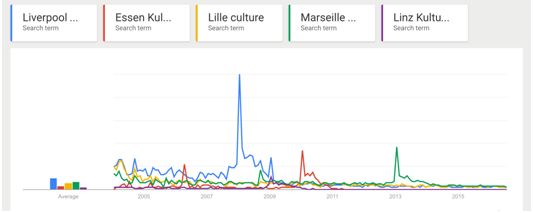Liverpool 2018: Exploring the image of Liverpool online
Added on Tuesday, November 15th, 2016
…
When I joined the ICC in January 2016 to work on the Liverpool 2018 project, one of my main tasks was to develop a methodology capable of identifying and tracking long-term change in the online image of Liverpool following its year as European Capital of Culture (ECoC) in 2008.
Of course, the galaxy of social media platforms that exists now compared to 2008, as well as the often restrictive terms under which social media data is made available, meant that this was no easy task. However, by focusing in particular on an analysis of Google Trends and Twitter data, we have already begun to uncover some revealing findings – some of which I will present here in this blog post.
Googling Liverpool
Google Trends is a tool that allows one to see how often a particular term is searched for on Google relative to the total volume of searches on that particular day.
When we looked at the Google Trends data for Liverpool, the most striking trend by far was the dominance of football-related searches – indeed to the extent that the Google Trends graph for ‘Liverpool’ correlated neatly with the graph for ‘Liverpool FC’. However, by narrowing down our search terms and looking more closely at searches related to the ECoC year, it became apparent that the event has generated significant and sustained online attention.
An examination of all the ECoCs since 2004 (the earliest year for which Google Trends data is available) highlighted how each city has experienced broadly similar, cyclical search patterns – with spikes in search activity during the bid stage, the victory announcement and the build-up in the autumn immediately preceding the ECoC year. The opening event in January also usually provokes a spike in searches, which is then followed by a few more spikes during the year (corresponding with high-profile events), before a last surge in searches during the closing celebrations.
Where Liverpool appears to have differed from other host cities, however, is in the volume of search activity associated with the event. Indeed, systematic comparisons between Liverpool and the other host cities since 2004, using a series of keyword combinations ([city-name]+[‘culture’], [city-name]+[‘culture’ in the local language], and [city-name]+[‘European Capital of Culture’ in the local language]) and region settings (worldwide, UK and country of the EcoC), reveals that Liverpool has generated more attention than any other host city during this period.
Worldwide searches for ‘Liverpool Culture’, ‘Essen Kulturhauptstadt’, ‘Lille culture’, ‘Marseille culture’ and ‘Linz Kulturhauptstadt’.
Source: Liverpool 2018 research programme (2016)
Whilst Google Trends cannot account for searches on social media platforms such as Facebook and Twitter, it does also allow us to track search trends on YouTube from 2008 onwards (since this media is owned by Google), with this data likewise confirming the Liverpool ECoC as the most searched for among the host cities from 2008 onwards.
Liverpool on Twitter
In order to investigate the image of Liverpool on social media today, I also collected over 80 thousand tweets about Liverpool – all of which were posted over a period of little more than a day in March 2016 – and then coded these tweets thematically, following a similar approach to that used formerly by Impacts 08 and now by Liverpool 2018 to analyse press coverage on Liverpool.
Similar to search trends for ‘Liverpool’ on Google, there was an overwhelming prevalence of football-related tweets within this Twitter data (almost 80 per cent of the tweets were about Liverpool Football Club’s results, fixtures and players). However, once the data on football and the tweets coded as irrelevant or not possible to code (due to broken links, lack of a clear context/interpretation, etc.) were excluded, culture began to emerge as a major theme, accounting for 46 per cent of the remaining tweets.
Thematic coding of tweets posted on the 22nd March 2016.
Source: Liverpool 2018 research programme (2016)
In order to examine more closely the cultural dimension to this online discussion, a second collection of tweets, using the query ‘Liverpool AND Culture’, was set up and ran from the middle of March until the end of September 2016. This second dataset includes around 12 thousand tweets, which were again coded thematically.
Among this second group of tweets, the most common focus was the Beatles, followed by the various festivals and music events that took place over the summer. The latter group of tweets highlights how Liverpool’s cultural organisations are actively promoting their events on social media and – in parallel to these organisations and their networks – how there are also users devoted to regularly listing and reviewing on Twitter the various cultural events taking place across the city.
Looking at the distribution of particular themes within this dataset over time, it is also evident that spikes in the discussion of particular subjects were often prompted by news items (e.g. the window of the Museum of Liverpool being voted as the one offering the best views in the UK), events or trending hashtags – including the EU referendum, which provoked a surge of tweets focused on the ECoC and its impact on the city during the week of the referendum vote.
Thematic coding of tweets related to ‘Liverpool AND Culture’.
Source: Liverpool 2018 research programme (2016)
Next steps
Our research thus far on the image of Liverpool on digital media has revealed both the city’s success in generating online searches during its European Capital of Culture year and also the current legacy of the event – particularly in connection with the EU referendum debates this summer. Additional collection and analysis of tweets in 2017, alongside the triangulation of these results with those emerging from the other strands of the research programme, will allow us to further investigate the impact of major events like the ECoC on the online image and representation of a city.










